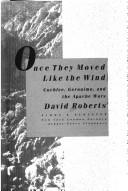Check nearby libraries
Buy this book

Of the many tales of conflict and warfare between the U.S. government and the Indian tribes, perhaps none is more dramatic or revealing than the story of the Apache wars. Those wars were the final episode in the U.S. government's subjugation of the indigenous peoples; the surrender of Geronimo in 1886 effectively ended the Indian wars. As Anglo settlers moved into the Southwest in the mid-1800s, skirmishes with the Indians intensified. The Apaches were the most feared of the Southwestern tribes, both by Anglos and by other Indians. Under the leadership of the charismatic Cochise, the various Apache groups unified in opposition to settlers and to U.S. Army patrols. Although soldiers lured Cochise into a trap through trickery, he quickly escaped and was never recaptured.
Shortly before Cochise's death, General George Crook was sent to the Southwest to subdue the Apaches and settle them onto reservations. Crook's predecessors had had little luck against the Apaches, who seemed to be able to melt into their mountain homelands when pursued. But Crook began using as scouts Apaches who had agreed to surrender and move to reservations. Thanks to the tracking skills of these Apache scouts, Crook was able effectively to pursue the free Apaches now under the leadership of Geronimo and other warriors. Geronimo, upset about the loss of his freedom, accepted the reservation for months at a time, only to break out and resume his resistance. In September 1886, recognizing the hopelessness of endless flight, he surrendered for good, having successfully eluded one-fourth of the U.S. Army.
Once They Moved Like the Wind is the epic story of the Apache campaign, told with sympathy and understanding. David Roberts recognizes that in struggling to save their land, the Apaches were fighting to preserve their way of life. Evenhandedly, he describes the sorry history of the reservations, where the Apaches were deceived and abused by the U.S. government and its agents, while at the same time he acknowledges reliable contemporary sources that reported on the Apaches' cruelty. Using historical archives and contemporary accounts, David Roberts has written an original, stirring account of the last years of the free Apaches.
Check nearby libraries
Buy this book

Previews available in: English
Subjects
Apache Indians, Wars, Biography, History, Kings and rulersShowing 1 featured edition. View all 1 editions?
| Edition | Availability |
|---|---|
|
1
Once they moved like the wind: Cochise, Geronimo, and the Apache wars
1993, Simon & Schuster
in English
0671702211 9780671702212
|
aaaa
Libraries near you:
WorldCat
|
Book Details
Edition Notes
Includes bibliographical references (p. [349]-355) and index.
Classifications
The Physical Object
ID Numbers
Community Reviews (0)
Feedback?History
- Created April 1, 2008
- 11 revisions
Wikipedia citation
×CloseCopy and paste this code into your Wikipedia page. Need help?
| July 23, 2024 | Edited by MARC Bot | import existing book |
| November 16, 2020 | Edited by MARC Bot | import existing book |
| May 19, 2019 | Edited by MARC Bot | import existing book |
| April 5, 2014 | Edited by ImportBot | Added IA ID. |
| April 1, 2008 | Created by an anonymous user | Imported from Scriblio MARC record |










